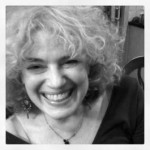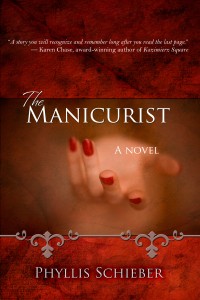 “The Mother I Will Never Forget”
“The Mother I Will Never Forget”
by Phyllis Schieber
My mother, a survivor of the Holocaust, thought it was a miracle that she could feed, clothe and keep her children safe. For a woman who had survived the Tranistria Death March when she was fourteen, it must have seemed an extraordinary triumph. But many years later, she discovered Dr. Leo Buscaglia, an inspirational writer and speaker, on television, and she learned that it was also important to verbally express love to those you cherished. “I’m sorry,” she said. “I didn’t know.” From then on, every conversation ended with, “I love you.” I admired her willingness to learn and to grow. She was charming too. People were drawn to her, captivated by her beauty, her wit and flirtatious ways. But she was fragile, damaged. I seem to have always known that just as I always knew it was my responsibility to care for her.
After The Manicurist was released, I was interviewed on Blogaid Radio. The host, Mananna Stephenson, suggested that the relationship between Tessa, the protagonist in The Manicurist, and Ursula, her mother, had a dynamic similar to my relationship with my mother. Ursula, who is extremely troubled and needy, depends on Tessa to help navigate the world. Though I shouldn’t have been, I was surprised by the resemblance between the circumstances of Tessa’s life to my own life.
I frequently write about the complex relationships between mothers and daughters. I loved my mother. She could infuriate me with her stubbornness and her neediness, but she could also touch my heart in ways that no one else could. Though she hardly wore any, she loved make-up and always bought items that came with a special offer. Once I said, “Mom, why do you buy all this stuff?” She smiled and said, “Because once in awhile, you just feel like a new lipstick.” She was right. My mother was shaped by an experience so devastating that I often wondered how she managed to still find joy in anything, to still love. But she did.
The relationship between Tessa and Ursula is so laden with disappointments and pain that it seems unlikely the two will ever be able to overcome their differences. Yet, throughout, they are unable to escape the bond between mother and daughter, even if it is a tenuous bond. From time-to-time in her later years, my mother would ask, “Was I a good mother?” I always reassured her that she had been a very good mother. And it was the truth. She did the best she could. And I believe that Ursula does the same. She wants to be good mother. That matters to her as it does to all of us who are mothers.
I dream about my mother sometimes. She’s always young, always smiling and laughing. Sometimes I’m cutting the threads between the scarves she sewed for a few cents each. I’m reading to her as the pastel colored chiffon tumbles around me, and she nods, listening and humming a song she could never quite remember the words to. That’s the mother I choose to remember. She was a good mother. That’s the mother I remember, the mother I will never forget.
THE MANICURIST by Phyllis Schieber is a March Monthly 100 for only $1.99! Get it today!








